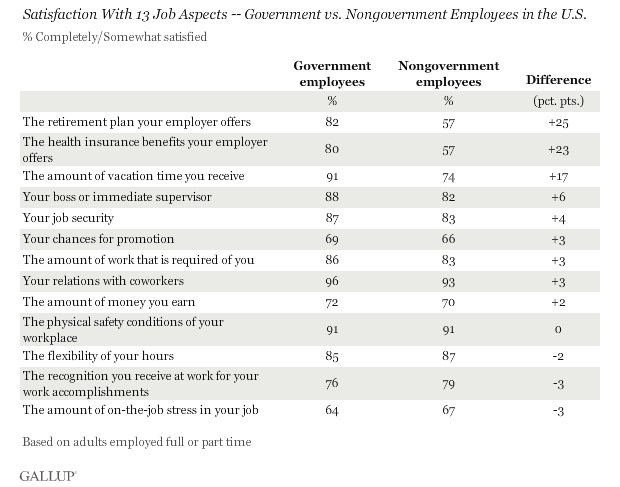Gov’t Workers Happier With Retirement Plans, Other Benefits
by Justin McCarthy
WASHINGTON, D.C. — Public and private sector workers are similarly satisfied with most of the 13 job aspects Gallup asks them about, but government employees are more likely to be satisfied with their retirement plans, health insurance and vacation benefits.

These ratings are based on combined data from the last five years of Gallup’s annual Work and Education poll, conducted each August since 2001.
The largest gap in satisfaction between government and nongovernment workers is in regard to their retirement plan. While 82% of government employees say they are “completely” or “somewhat satisfied” with their retirement plan, this percentage is much lower among nongovernment employees, with 57% reporting satisfaction.
The gap in satisfaction is nearly as large with health insurance benefits, with 80% of government workers and 57% of nongovernment workers satisfied with the benefits that their employer offers.
Government workers are even more likely to be satisfied with their vacation time than they are with their retirement or health insurance, with 91% saying they are satisfied. While most nongovernment employees, 74%, are also satisfied with their vacation time, there is a 17-percentage-point gap in satisfaction between the two groups.
Overall, private sector workers are least satisfied with their retirement plan and health insurance benefits, while government workers are least satisfied with their on-the-job stress.
In addition to vacation time, government workers are most satisfied with their relations with coworkers and the physical safety conditions of their workplace. Coworker relations and workplace physical safety are private sector workers’ top-rated workplace aspects.
Bottom Line
Government and private sector employees’ views on the various elements of their job make one thing clear: Government employees are much more satisfied than nongovernment employees with the traditional “benefits” of their job — namely, the retirement plan, health insurance benefits and vacation time.
Government benefits vary quite a bit, however, from federal benefits to state government benefits, and this also varies a great deal by state. But many government workers likely have pension plans — something increasingly rare in the private sector — and generous health plans requiring lower out-of-pocket costs than seen in most private sector plans. Government workers may also get guaranteed vacation of two to four weeks (or summers off for public school teachers) and likely all federal holidays.
On the other hand, a federal advisory body found last year that, on average, federal government employees earn more than a third less than their private sector counterparts, but these data show that government employees are just as satisfied, on average, with their pay as are private sector workers.
Historical data are available in Gallup Analytics.
Survey Methods
Results for this Gallup poll are based on combined telephone interviews from Gallup’s 2011-2015 Work and Education surveys, conducted each August with random samples of employed adults, aged 18 and older, living in all 50 U.S. states and the District of Columbia.
For results based on the total sample of 2,949 employed adults, the margin of sampling error is ±2 percentage points at the 95% confidence level. For results based on the total sample of 528 government employees, the margin of sampling error is ±5 percentage points at the 95% confidence level. For results based on the total sample of 2,421 nongovernment employees, the margin of sampling error is ±3 percentage points at the 95% confidence level. All reported margins of sampling error include computed design effects for weighting.
Learn more about how Gallup Poll Social Series works.
[Source]: GALLUP


